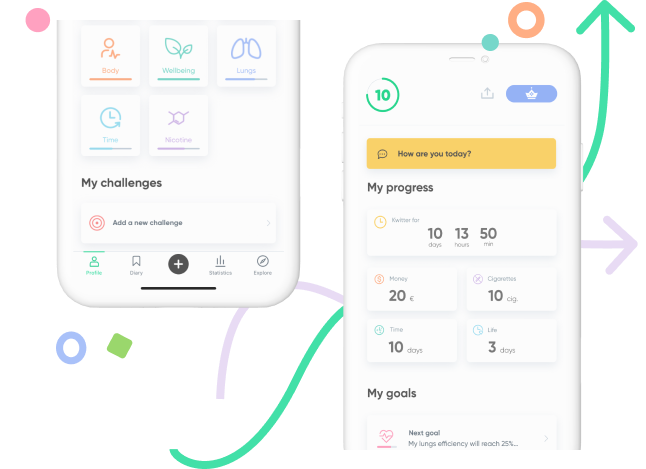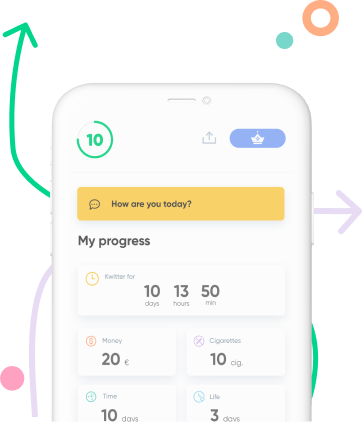December 11, 2019
Tips
Cleaning your lungs after quitting smoking
As you know, smoking harms your lungs. But did you know that there are some simple tips to clean your lungs after quitting smoking?
When we smoke, cigarette smoke settles on our bronchi and lungs. This affects our breathing significantly as inhaled carbon monoxide disrupts the body's oxygen supply. Contrary to popular belief, this phenomenon is not irreversible. Here are a few tips to help you clean out your lungs after you've stopped smoking.
The miracle cure!
Are you looking for a 100% effective and reliable solution to clean out your lungs? Here it is, respiratory cilia! Or, instead, stop smoking!
Indeed, the only way to thoroughly and effectively cleanse your lungs is to stop smoking and let your respiratory cilia push back and eliminate mucus to clear your airways.
But what are respiratory cilia? They are very fine cilia found on the walls of the cells that make up the respiratory tract (sinuses, trachea, bronchi) and which, thanks to their movements, allow mucus to circulate, eliminating waste and bacteria.
As you can see, there's no miracle cure. Your body does things right, and the only natural way to cleanse your lungs is through respiratory cilia. Depending on the individual, respiratory cilia take between 1 and 9 months to regrow.
According to a study published in the journal NEJM Evidence and carried out on 1.5 million adults in four countries (USA, UK, Canada, and Norway) over 15 years, a former smoker regains the life expectancy of a non-smoker around 10 to 15 years after quitting.
This means that the lungs regenerate to some extent after you stop smoking. The duration and intensity of your past tobacco consumption have an impact on this regeneration.
Does sport "cleanse" the lungs?
Regular physical activity is known to have many benefits, and this is even more true in the case of smoking cessation.
Besides, sport helps reduce the risk of weight gain, enables you to excel, controls stress, and gives you pleasure thanks to the endorphins it releases (the pleasure hormone). But it also offers a host of health benefits, such as reducing the risk of cardiovascular disease, high blood pressure, cancer, type 2 diabetes, and osteoporosis.
However, it is crucial to note that, contrary to popular belief, sport does not "cleanse" the lungs of tobacco's toxic substances. Although physical activity improves lung function by increasing oxygenation, it does not purge the body of the toxic substances responsible for cancer.
It takes around a year after smoking cessation for the respiratory cilia to regrow and evacuate these substances themselves. As a result, pulmonary symptoms such as coughing, sputum production, shortness of breath, and bronchitis are reduced.
But during this period of respiratory cilia reconstitution, you may experience coughing or even breathing difficulties. Please don't panic; this means that the cilia lining your throat and bronchial tubes are starting to do their job again, evacuating waste (which they were no longer able to do when you were smoking). That's where sport comes in, to give you better oxygenation and alleviate the discomfort of these symptoms.
If you're not used to exercising, why not try a gentle activity like walking or yoga? Kwit also offers in-app breathing exercises, which are ideal for helping you regain complete control of your breath.
Drink, drink, drink... water!
As mentioned above, the regrowth of respiratory cilia designed to clean the lungs can lead to coughing or breathing difficulties. Staying hydrated is essential, as drinking water liquefies mucus, making it easier to expel.
Drinking between 1.5 and 2 liters of water a day for bronchitis, which corresponds to around 9 glasses of water a day, is advisable.
You can also log on to the Kwit app once you've had a drink of water to overcome a craving!
Pay attention to your environment
To help your respiratory cilia grow back, paying attention to your environment is a good idea.
Indeed, if you stop smoking to let your lungs regenerate, it's a pity to smoke passively by inhaling other smokers' cigarette smoke. This would cancel out your efforts.
It's also advisable to avoid going out during peak pollution periods, especially if you're already coughing due to quitting.
Remembering to air your home correctly to avoid dust accumulation is also helpful in ensuring that your lungs are in the best possible condition to regenerate and clean themselves.

Progression over time
Very quickly after quitting, your body feels better and eliminates the harmful effects of smoking!
👉 20 minutes later: Blood pressure and heartbeat return to normal.
👉 8 hours later: Carbon monoxide levels in the blood are halved. Cell oxygenation returns to normal.
👉 24 to 72 hours later: The body no longer contains nicotine. Carbon monoxide is completely eliminated from the body. Breath improves.
👉 48 hours later: Taste and smell improve.
👉 2 weeks later: Complexion is brighter. The risk of heart attack has begun to decrease as coagulation has normalized.
👉 1 to 9 months later: Coughing and fatigue diminish. Breathing becomes easier. Walking becomes easier.
👉 9 months later: Respiratory cilia grow back.
Kwit will remind you of all this information as you go along, so don't panic!
In the end, there's no miracle solution for cleaning out your lungs other than to stop smoking and let your body do its work. However, you can help your body do its job as well as possible through the small everyday gestures mentioned in this article.




